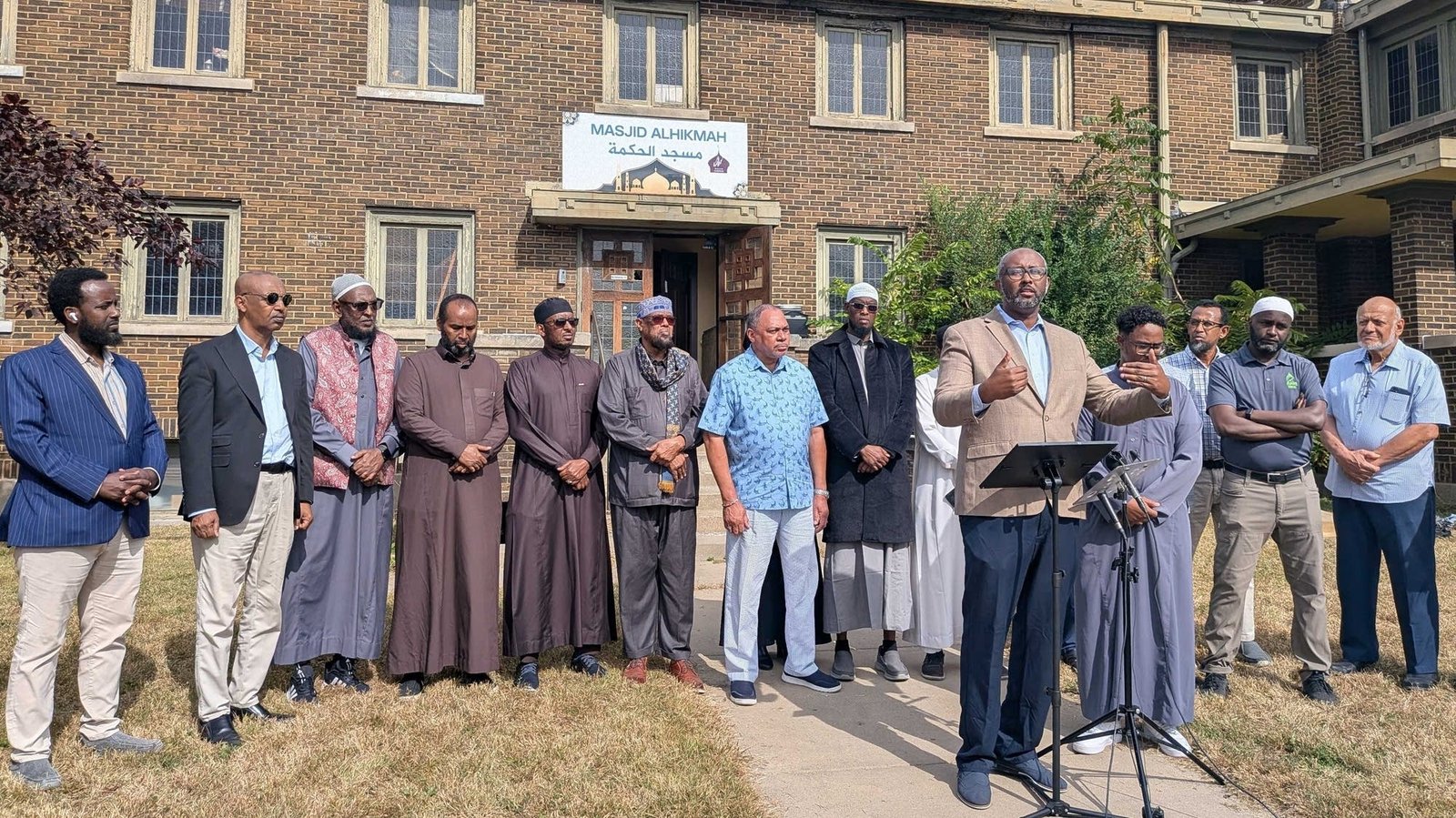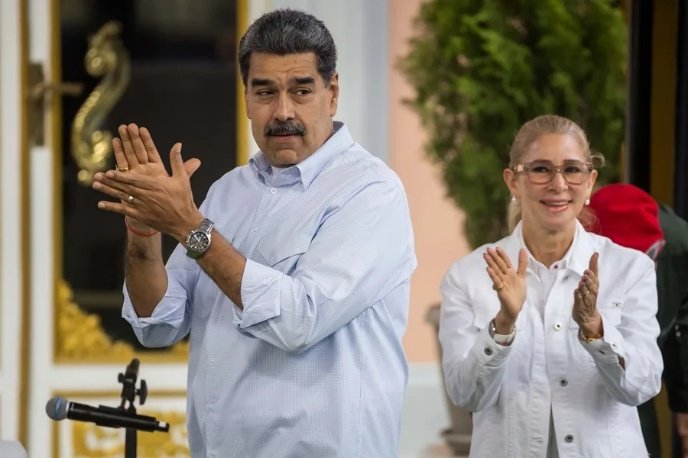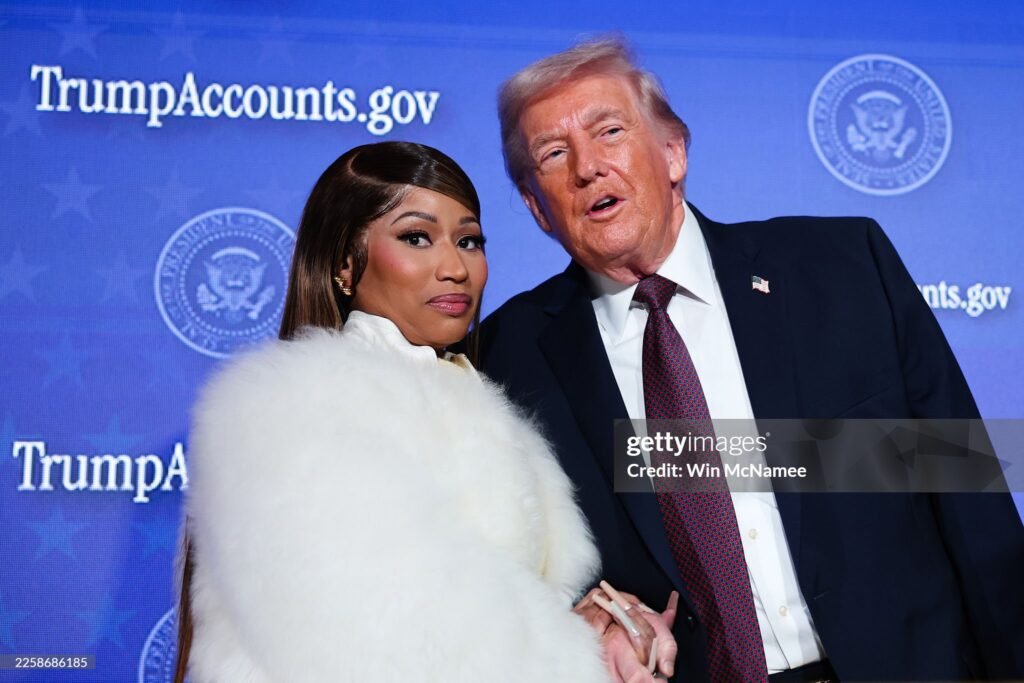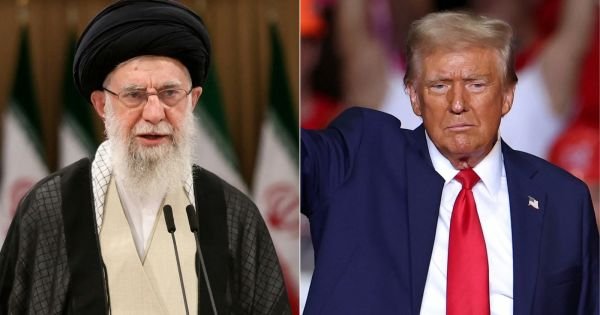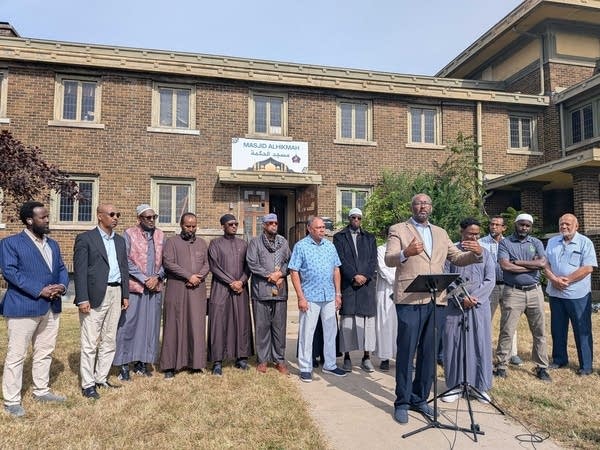
A few days prior, there was a fire at the same mosque. Police are currently investigating whether the two mosque incidents are connected. Joining me today to talk more about this are Rabbi Marcia Zimmerman, the Senior Rabbi at Temple Israel. Thanks for your time this afternoon, Rabbi.
MARCIA ZIMMERMAN: Thank you for including me.
NINA MOINI: And also on the line, very happy to have Jaylani Hussein, the Executive Director of Minnesota’s Chapter of the Council on American Islamic Relations, CAIR. Thanks for being on the show as well, Jaylani, good to talk to you.
JAYLANI HUSSEIN: Absolutely. Thank you for having me.
NINA MOINI: The circumstances we’re talking about, of course, are not good. Rabbi, I’ll start with you. What can you tell us that you’ve heard about the vandalism that occurred, that was found out, it looks like, today?
MARCIA ZIMMERMAN: Yes. Early this morning, anti-Semitic graffiti was discovered on the exterior of Temple Israel in Minneapolis. And it was anti-Semitic graffiti, included the phrase “Al-Aqsa Flood,” which– and several red triangle symbols, which was the code name for the use by Hamas in the October 7 attack in Israel, and this was the second anniversary of that attack.
NINA MOINI: And Rabbi, this is already obviously an emotional week marking two years since October 7. How did all of this feel, or what did you do? How did you spring into action when you found out this had occurred?
MARCIA ZIMMERMAN: So I was on my way to a monthly downtown interfaith breakfast that we have every month where Jews, Christians, and Muslims get together, senior clergy get together and have breakfast and talk with each other, the antidote to such hate that we heard about and discovered this morning.
So for me, it was the juxtaposition of the work that Temple Israel has done and feels passionately about being a positive citizen in our neighborhood, in our state, in our city, and having hate rhetoric on the side of our building.
NINA MOINI: Mm-hmm. Our reporters stopped by the temple this morning and saw that there was a Jewish Community Relations Council security team, some of their members on the scene. What is their role in incidents like this?
MARCIA ZIMMERMAN: So we have a security team who reaches out to law enforcement and to other community affiliates, and they are one of our community affiliates in the Jewish community.
NINA MOINI: What’s the hope there, that people will see them and feel safer?
MARCIA ZIMMERMAN: No. They were here to help us and to make sure that our security team gets the support that is needed. That’s what they do.
NINA MOINI: Mm-hmm. Yeah. And I ask about that, too, Jahlani, because all of– the idea right now about safety and how to be more safe and what actions to take are so front of mind for people, especially after the attack, of course, on Annunciation Catholic Church. The break-in at Al-Hikmah Islamic Center on Tuesday happened just a few days after there was a fire in the basement entrance of the same mosque. How are you approaching this, Jaylani?
JAYLANI HUSSEIN: Well, thank you for having me this morning, and my heart goes out to Temple Israel, Rabbi Zimmerman, and your community, obviously. We’re dealing with the same issue. At the Al-Hikmah– or Masjid Hikmah, we had the second fire in Minnesota this year at a mosque. We had an incident that occurred earlier this summer actually a couple of weeks before this incident.
And Minneapolis Fire ruled it accidental. Unfortunately, they did not really do a full investigation into this, and now they are. And cameras show clearly that it is the same person who started the fire at the doorway.
One thing to add about that doorway in the basement, it is an actual door to the daycare. It’s not a used door for entering and exiting the kids, but it is a door that actually on the other side, there were children inside of it when that fire started. And thankfully, there was a community member who saw it, immediately responded to it, and we were lucky that we are not talking about another tragedy here.
But because we believe the light action by the Minneapolis Fire and proper investigation, the same person came back, and this is what we have seen, that This. Is the third incident now in Minnesota where we’ve had individuals commit arson and then come back either at the same location or different locations.
The second– the third incident, one incident was we stopped it in St. Paul where the individual who started the largest of these fires that completely destroyed the St. Paul Mosque, Masjid Tawhid. Over $1.5 million in damage. That person actually– if it wasn’t for law enforcement, he did inform them that he was planning to start fires at a church and a mosque later that day, actually. Thankfully we were able to apprehend him.
So this is a trend that we really want to reverse here in Minnesota. Minnesota leads the nation in attacks against mosques. We have 40-plus incidents in the last three years. Last year alone, we had 16 separate incidents of targeting of mosques, vandalism, and among other things. The nearest state to us was California with five.
And I know a lot of people are just not aware of this, but this is a trend that we are trying to reverse significantly. And we obviously know the war in Gaza and the genocide has significantly increased the threat for both of our communities, and we’re seeing that play out across this country.
NINA MOINI: Well, police say they’re currently investigating whether there’s a connection between the two incidents, the most recent ones we’re talking about, but obviously, Jaylani, you are not happy with the response from law enforcement. We had a similar conversation with you, Rabbi, and another Representative from CAIR last December, actually, when Temple Israel was vandalized and there was an online threat at a local mosque as well.
Rabbi Zimmerman, what do you think needs to happen to try to curb some of these types of incidents? It’s really hard to when and where something like this might happen, and then it’s hard to if it’s going to be treated in the legal system as a hate crime or how it’s going to be categorized or investigated. What do you think needs to change, Rabbi?
NINA MOINI: So first of all, I think that we are not going to let hate have the last word. That we work very, very intently on bringing together communities, religious communities. I’ve gotten a call from all of my interfaith colleagues who I was supposed to be at breakfast with, and so they heard about it fairly quickly.
So from all traditions, have reached out. That, for me, is a huge antidote. I’ve gotten personal phone calls from Governor Walz and Mayor Frey. And I think that coming together and speaking as religious communities is the antidote to hate. This is not anything that’s going to solve any problems, and we have to work together to create a better community for our children and for future generations.
NINA MOINI: Jaylani, I’ll give the last question to you here. Do you think there’s a need for increased security measures or funding for places of worship around the state? Is that something that you’ll be calling on from lawmakers? And you have not obviously been happy with the response from law enforcement. What about lawmakers? There have been calls from the Catholic faith leaders, too, of course, after the mass shooting at Annunciation.
JAYLANI HUSSEIN: We’ve tried. We’ve tried many times, and we kept telling them we have a concern. There is a national– there’s a federal funding. It is not enough for the state of Minnesota and the needs that we have here. We’ve asked state legislators to step up. They’ve actually decreased the already existing funding from this year. And again, we’re back to square one.
Funding for security helps. It prevents these types of attacks, and most importantly, it gives our communities assurances that we have some security protocols to prevent. And we need state leaders to respond. I don’t think state leaders have been responding. In fact, they’re almost, somehow, not concerned about these incidents while we are seeing, as communities of faith, increase in them.
In fact, Governor Walz has yet to call the imam. He’s yet to even visit a mosque that has been targeted since 2023. So leaders continue to say one thing, but actually act differently, and we’re the community suffering in the middle of it.
So we need our community, the leaders, the faith traditions, and the listeners of MPR today to realize that safety is really in the hands of all of us. Most of these cases are resolved through public– it has been the public that helped bring the gentleman who started two fires in two mosques in two days, he’s now admitted guilt just a few weeks ago.
And so we need funding, but we also need the community to realize that safety is in the hands of us, and we all need to play a role and speak up in these moments. And show love, and also at the same time show concern that this behavior has to end, and there has to be more accountability to these individuals.
Our places of worship are not just places of worship, they are breathing life of all of us. In fact, there are children at all of our churches and mosques, and just this morning, the synagogue, the same thing, it was children that were looking at that graffiti and trying to make sense out of it, and that’s the reality. That those spaces are really important to be protected.
And even Chief O’Hara mentioned that he’s going to make sure that 911 calls that are coming from mosques are going to– and mosques and synagogues and churches and places of worship and also considered soft targets would get priority.
Yesterday, the imam and the leaders who called and were told to call 311 after they were actually literally trying to get this person apprehended, who refused to leave the building and threatened to burn it once again. So we have a lot of work to do, and I hope the community and the public can get involved.
NINA MOINI: OK. We’re certainly going to look into the things that you’re talking about here and get responses from the people that we need to get responses from, but I really do appreciate both of you coming by the show again and sharing your experiences. I hope that when we talk again, we’re having a different conversation. Thank you both so much.
MARCIA ZIMMERMAN: Thank you.
JAYLANI HUSSEIN: I hope so, thank you.
NINA MOINI: That was Rabbi Marcia Zimmerman, the senior Rabbi at Temple Israel in Minneapolis, and Jaylani Hussein, the Executive Director of CAIR Minnesota.

